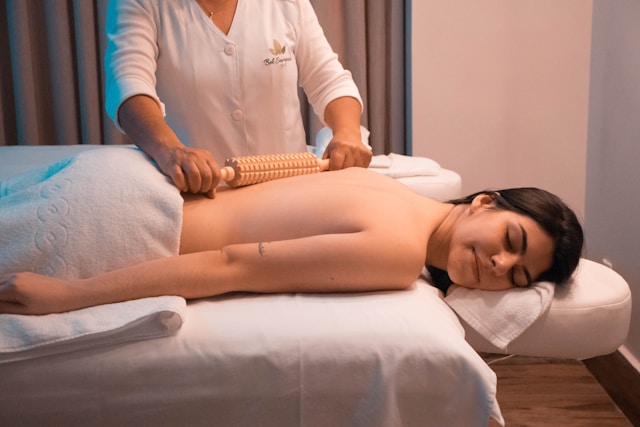Massage has become one of the most popular healing modalities. Conventional and alternative medical practitioners use it, often covered by health insurance.
Therapeutic massage activates the body’s relaxation response and lowers heart rate and cortisol levels – all contributing to reduced stress levels. It also boosts circulation to promote overall well-being and is a powerful tool for recovery and rehabilitation from illness or injury.
Reduced Stress
Massage therapists can help reduce stress in many ways, including lowering heart rate, decreasing blood pressure, and releasing feel-good hormones like endorphins. It also helps to decrease pain and increase range of motion.
Many people seek out complementary and alternative medicine (CAM), such as massage therapy, to manage stress, anxiety, and other health issues. A massage therapist Bowling Green, uses various techniques to manipulate soft tissue, including stroking, kneading, rocking, tapping, and applying steady pressure. These techniques reduce muscle tension, promote relaxation, and improve circulation.
In addition, a massage can help to decrease the stress hormone cortisol and increase positive hormones such as serotonin and dopamine, which naturally calm the body’s fight-or-flight response. It can lead to reduced symptoms of stress and anxiety, such as headaches, backaches, and fatigue. Mothers and newborns may also benefit from a massage as studies have shown that premature babies who are massaged regularly cry less, are more alert, and gain weight faster than those who don’t receive regular massages.
Improved Sleep
The patterned and purposeful manipulation of skin, muscles, connective tissues, and tendons with varying degrees of pressure, known as massage, has been shown to boost circulation, support the immune system, decrease pain, diminish depression, reduce anxiety and stress, alleviate fatigue from cancer treatments or other illnesses, and increase flexibility. Massage therapy has been linked to improved sleep quality. The relaxation produced by massage can help people struggling with insomnia or other sleep-related disorders. It can also treat sleep disorders, relieve low back pain, help ease chronic constipation, improve pulmonary function in young asthma patients, promote weight gain, enhance motor development in premature infants, and reduce symptoms of fibromyalgia and other conditions.
Research shows that when you receive a therapeutic massage, your body’s cortisol levels decrease, and serotonin and dopamine levels rise. Serotonin is a neurotransmitter in the brain that controls an individual’s sleep and wake cycles. It’s a precursor to melatonin production, the hormone that enables you to sleep. It makes it easier to fall asleep and stay asleep, giving you a better sleep quality.
Reduced Anxiety
Anxiety is a natural stress response, but in today’s fast-paced world, stress tends to accumulate. Even joyous occasions like getting married or having a baby can generate considerable stress. When anxiety is not dealt with appropriately, it can result in depression and anxiety-related disorders.
Massage therapy can reduce anxiety by promoting relaxation, lowering the heart rate, and increasing the release of certain hormones that promote well-being. It can also help control emotional responses to stress and reduce the body’s level of cortisol, a damaging hormone that supports the fight or flight reaction.
Some conditions, including autism and atopic dermatitis/eczema, show signs of improvement when patients receive regular massage. However, it is essential to note that individuals with rheumatoid arthritis, high fever, low blood platelets, and white blood cells, or cancer should not receive massages. It’s necessary to consult with your doctor before receiving a massage, as it may affect the absorption of certain medications. By providing this information, you can decide about your treatment options.
Increased Energy
A skilled massage therapist can help you recover from injury and increase your energy levels. Injured muscles and tissues require increased oxygen and nutrients to heal and remain healthy. Massages enhance blood and lymphatic fluid circulation throughout the body.
This is an obvious benefit because when you get more restful sleep, you’ll wake up feeling rested and ready to face the day. It has also been shown that regular massage sessions help regulate hormones like dopamine and serotonin, which stabilize moods and boost natural energy.
Improved blood circulation reduces fatigue by supplying more oxygen to cells. Flushing away lactic acid after workouts speeds muscle recovery by reducing soreness and stiffness. In addition, many people feel energized after a massage due to the delightful sense of relaxation that they experience. This is because the techniques and pressure a massage therapist applies stimulate the release of endorphins, the brain’s “feel good” chemicals.

